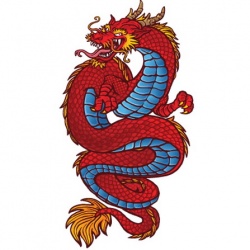Chinese water dragon
Chinese Water Dragon (Physignathus cocincinus) is an agamid lizard native to East and Southeast Asia. It is also known as Asian Water Dragon, Thai Water Dragon, and Green Water Dragon. A related species, P. lesuerurii, is often called the Eastern or Australian Water Dragon.
Details
Chinese water Dragons can grow up to 1 meter but 2/3 of this is tail. Colouration ranges from dark to Light green. Diagonal stripes of green or turquoise are found on the Body, while the tail is banded from the middle to the end with green and dark brown. Their undersides range from white, off white, very pale green, or pale yellow. But more attractive are their throats, which can be quite colourful (generally yellow, orange, or peach), some with a single color, some with stripes. Adult males have larger, more triangular heads than females, and develop larger crests on the head, neck and tail, and are larger in general. The tail, slightly over two-thirds of the entire Body length, can be used as a weapon, for Balance, and to assist swimming.
Like many other reptiles the Chinese water dragon possesses a small, iridescent, photosensitive spot between their Eyes referred to as the pineal gland (or colloquially as the third Eye) that is Thought to help thermoregulate their bodies by sensing differences in Light to assist with basking and seeking shelter after sunset.[2] Since it recognizes differences in Light, the pineal gland can also help the lizard avoid predation from birds and other aerial threats.
Habitat and behaviours
Native to the lowland and highland forests of India, Northern and southern China, and eastern and southeastern Asia (Thailand, Vietnam, Laos, Cambodia, Burma), Chinese water Dragons are most commonly found along the banks of freshwater lakes and streams. They are active during the day (diurnal), and spend most of their time in the trees or plants (arboreal). If threatened, the dragon will drop from the trees into the water and either swim to safety or remain submerged for up to 25 minutes. Water Dragons live in areas with average humidity levels of 40–80% and temperatures ranging from 80–90 °F (26–32 °C)
Diet
Though they will also eat vegetation, the diet of the water dragon consists mainly of insects, supplemented with an occasional small fish, mammal or reptile.
Captivity
Chinese water Dragons are very friendly reptiles and are friendlier than an Iguana. Also this pet needs to be handled at least once a day for it to not become aggressive. Its habitat needs to be tall because they like to climb on tree branches. Chinese water Dragons need to have a humid tank or cage.
For the captive lizard, crickets, locusts, cockroaches and mealworms are good staple foods, and they may eat as many as 3–5 during feeding, depending on the size. Insects should be gut loaded prior to feeding with foods such as carrots, sweet potatoes, apples, or bran oats. This increases the nutritional value of the insects. Insects can also be dusted with calcium and nutrient-rich powders, which can be found in reptile pet-stores. Powders such as this should be used in moderation and as specified. Meal worms and wax worms are favorites, though wax worms should be fed occasionally, as their nutritional value is low. Worms from the garden are also considered a nice treat, however, these are not recommended as they may have been contaminated with pesticides or other chemicals.
